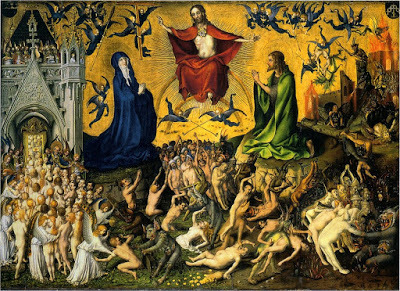Last Judgments
 The Last Judgment...ain't gonna happen, unless we make it happen here and now
The Last Judgment...ain't gonna happen, unless we make it happen here and now(Painting by Stephan Lochner)
One of the most comforting aspects of my Catholic youth was the idea that one day there was going to be a great accounting. In the Hereafter the Lord, sitteth on his throne, was going direct all the bad people to His left for eternal damnation and all the good to his right for the eternal last laugh. This promise of ultimate justice is a thing that is too often lost on those who are not religious, are anti-religious, or whose view of religion is limited to the crackpot fundamentalism that dominates our news and entertainment. But that promise has been one of religion’s most compelling features at least since Jesus. He really was a revolutionary in prophesying that the meek would inherit the earth (all available evidence to the contrary) and proclaiming that in his heaven the poor and downtrodden would be on an equal footing with the rich and powerful…unlike the Elysium Fields once reserved for the elite of Ancient Greece. That promise pretty clearly played an enormous role in drawing the peasantry of Europe, the peons of Latin America, and the slaves of America into the arms of the Christian Church. However much the various church hierarchies over the centuries may have perverted and exploited it, faith in Judgment Day is key to understanding religious adherence. It surely was for me growing up surrounded and confronted by bullies and keenly aware of injustice. As a result I can readily empathize with those who cling to a religious belief in the ultimate settling of scores when they find themselves up against overwhelming malignant forces who often seem to be getting away with their crimes. After all, short of abject surrender to cynicism or despair or violent, likely doomed revolution there aren’t many alternatives. Empathy, however, is all I have left from my religious upbringing because I no longer believe that there will be a grand righting of wrongs in the Great Beyond. If it doesn’t happen here, I now firmly believe, it doesn’t happen anywhere...which is why I twice experienced very guilty pleasure this week.The first was upon hearing of the death of accused pedophile and child sex trafficker Jeffrey Epstein by alleged suicide. Whether it was actually suicide, or greatly assisted suicide, or outright homicide was of little matter to me--although it should be of far greater concern to Attorney General William Barr, who was (ho-ho) in charge when Epstein’s politically convenient demise came about, and who seems to be constantly jumping up and down for God’s attention: “Pick me! Pick me for eternal damnation. Please, pick me!”. I know there is legitimate concern for justice for the brave but abused young women who came forward to bear witness against Epstein. But if they had gotten their day in court, we pretty much know how that would’ve gone…months of enduring Epstein’s smirking mug on the nightly news; months of further abuse of these young women as their sex lives, morals and wardrobes were subject to cross examination by high-priced (Harvard?) lawyers and journalists in hot pursuit of “both sides”; and ultimately judgment being handed off to a judge or jury whose sense of right and wrong is predetermined by where they live, how they get their news, and who they voted for. Better a dead Epstein, I say, than Epstein in some Federal prison for the rest of his life, yukking it up with El Chapo while waiting for his inevitable 60 Minutes jailhouse interview. My other pang of delicious guilt came while watching a Netflix series on the Roman Empire, chronicling the reign of Commodus. For pop culture reference Commodus was the emperor who was the nemesis of the Russell Crowe character in the Ridley Scott epic, The Gladiator. In the film Commodus was played by Joaquin Phoenix, who was much closer in physical appearance to the actual Commodus than the Bay Watch-like actor cast for the Netflix series. Yet in style and content of character, they both conveyed Commodus as history has come to know him…a vain, petty, reckless megalomaniac. He put his name and likeness all over Rome, including changing the name of Rome itself to Colonia Lucia Annia Commodiana. He used his 12 names* to rename the months of the Roman calendar. He replaced the head of one his predecessors on a statue outside the Colosseum with his own and added the inscription: "the only left-handed fighter to conquer twelve times one thousand men". And inside the Colosseum he fired up his cult followers and dismayed the sober and elite by playing at gladiator. He routinely defeated those who merely succumbed to his position as emperor and clubbed to death the sick and disabled who were gathered up and dumped before him to die at his pleasure. If, like me, that portrait of Commodus reminds you of any contemporary figure, you can appreciate the grim satisfaction I felt when those closest to Commodus could take no more of his unhinged narcissism and plotted his assassination. History says he was strangled in his bathtub by a man named (Irony Alert!) Narcissus, who had mentored his gladiator ambitions. For the sake of drama, no doubt, the Netflix series allows Commodus to die in hand-to-hand combat with Narcissus. In either case, watching a bad man pay the price for his badness in the temporal world…even temporal antiquity…does far more to affirm the idea of universal justice than deferring the human hunger for justice until some imaginary Judgment Day.
 Lasting image of Mussolini and his mistress. Tastefulness aside,
Lasting image of Mussolini and his mistress. Tastefulness aside, there is something edifying and satisfying in seeing
bad people come to well-deserved ends.
* Lucius, Aelius, Aurelius, Commodus, Augustus, Herculeus, Romanus, Exsuperatorius, Amazonius, Invictus, Felix, and Pius
Published on August 16, 2019 14:04
No comments have been added yet.



